Praise for the Military
While praise for the military often goes overboard, the reaction to the McChrystal flap shows our armed forces at their finest.
One of my recent pet peeves has been the deification of the military, in which ordinary actions are considered heroic and far too much deference is given to those who served. It’s an understandable artifact of an all-volunteer force in which most of our elites not only bypass service but have little day-to-day contact with those who do or have. But it’s an unhealthy attitude in a democracy.
That said, it’s worth praising the real virtues of the military, as Ezra Klein does this morning:
McChrystal’s comments themselves amounted to impolitic and unwise gripes about his bosses in front of a reporter. In any other context, it’d be a story, but not all that interesting of one. The outrage, however, was fueled by military rules and traditions that allow very little public criticism of civilian leadership in order to ensure that political and strategic disagreement doesn’t curdle into a culture of opposition among the people with all the weapons. McChrystal was clearly lax on policing criticism within his command, but when the system was made aware of that failure, the system worked. You did not see politically disgruntled generals rallying around McChrystal.
Instead, what you saw was David Petraeus taking a command that amounts to a demotion from his current post and could destroy his reputation as a miracle worker. Petraeus’s successes in Iraq gave him a tremendous reputation and credibility as a big, strategic thinker. He could rest on that, retire on that, run for office on that. Instead, Petraeus is going to put that reputation back on the line in service of a war effort that may well be doomed. Why? Well, the civilian who leads the military asked him to, and a soldier obeys.
Quite right.
And I want to emphasize, again, that while my immediate and sustained reaction to the Rolling Stone article was that McChrystal simply had to be fired — and my general sense that McChrystal is arrogant even for a man of his accomplishment — he handled himself in the finest traditions of military service once the crisis broke. He manned up for his mistakes, made it as easy as he could on the president to do what had to be done, and went away quietly.
I will say, though, that while I have the utmost respect for David Petraeus — and that only increased yesterday — and think Obama’s choice here was a master stroke, I do worry about the Man on Horseback model it represents. The Army is, at its core, an institution and the continued reliance on one man’s indispensability is not without its drawbacks.
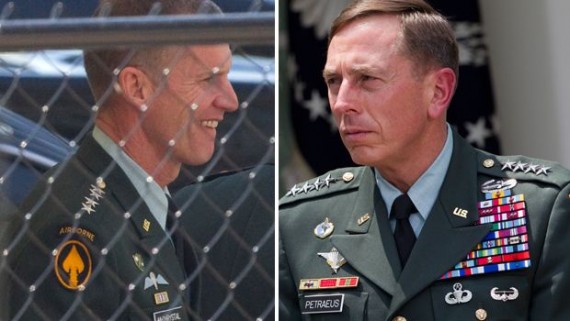

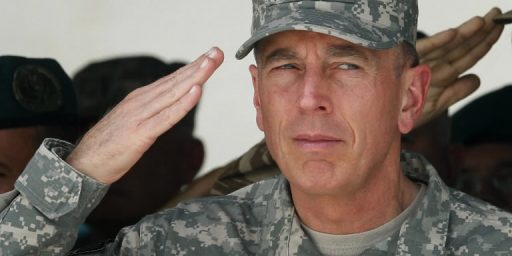
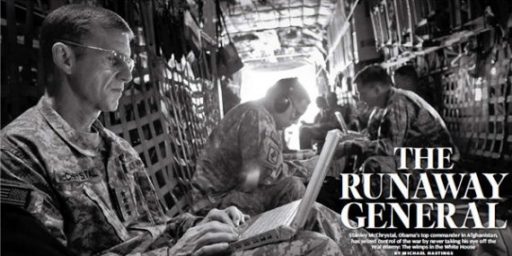
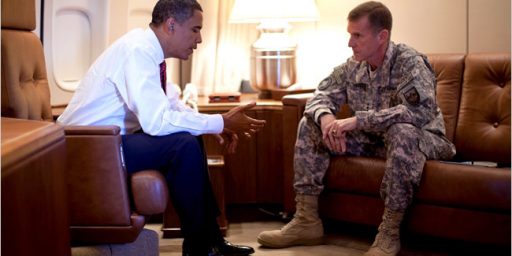

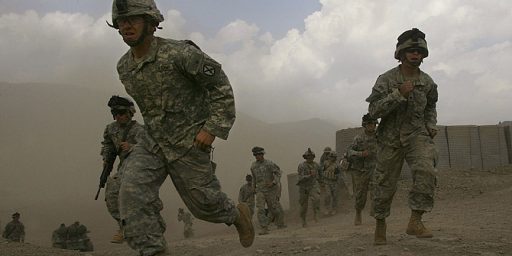
But James, the irony here is that your position, which I would describe as expecting the very highest degree of professionalism in the armed services, strongly encourages the Man on Horseback myth you fear. You want the Generals to play out the public role of loyal subordinate without personal views or agency, and where does that lead? That leads to Generals like George Washington and Dwight Eisenhower.
It should lead to generals who are virtually interchangable. Not that there won’t be stars among the stars, of course. But McChrystal’s deputy should certainly be fully equipped to step up.
There are an awful lot of good things about the military that a lot of civilians do not appreciate. At its best, when it had to deal with this kind of crisis, it functioned well. The military after action model is one that more civilian institutions should use.
I was struck by how those with no military experience tended to want to keep McChrystal and those who had thought he needed to go. The other point I think you should note here, is that those on the right who could have made this difficult, especially McCain, Graham and Lieberman, did not use this for political points. A pleasant surprise and kudos to them for placing country first.
Steve
I was struck by how those with no military experience tended to want to keep McChrystal and those who had thought he needed to go.
It almost always breaks down that way. This is just so engrained into the military culture as to be a non-issue.
The other point I think you should note here, is that those on the right who could have made this difficult, especially McCain, Graham and Lieberman, did not use this for political points. A pleasant surprise and kudos to them for placing country first.
McCain and Graham have both been military officers and Graham is a JAG; it would have been shameful for them to do otherwise. All three are, rightly, focusing the politics of this on the policy itself, calling for a realignment of the civilian side (which I agree is necessary) and calling for ending the July 2011 deadline (which I agree is logical given the president’s own declared policy but is not accordance with my policy preferences).
“It almost always breaks down that way. This is just so engrained into the military culture as to be a non-issue.”
Word. Ollie North was a hero to many on the nonmilitary right. Among Marines, he was definitely not. Nobody’s more rightwing than my brother–30-year Marine, commissioned officer. I asked why the antipathy towards North. His short and vehement answer, “He broke his oath.”
steve, I have a different take. Some of the most ardent supporters of the use of military force in Afghanistan (neocons) were calling for McChrystal to go: McCain, Lieberman, Graham, Bill Kristol, Stephen Hayes, Eliot Cohen, John Yoo and (conditionally) Max Boot.
It seems like there were two diametrically opposed groups that saw removal of McChyrstal as advancing their interest: One thought it would create an opportunity to rethink Afghan policy, the other thought it was necessary to save the McChyrstal plan.
“One of my recent pet peeves has been the deification of the military, in which ordinary actions are considered heroic and far too much deference is given to those who served. It’s an understandable artifact of an all-volunteer force in which most of our elites not only bypass service but have little day-to-day contact with those who do or have. But it’s an unhealthy attitude in a democracy.”
A-men!
Appreciation and support is great, see me in uniform (or seeing my son in uniform) and coming up to say “Thank-you,” IS ENOUGH.
And some of those that “say” the most platitudes were the very ones that did not just turn their backs, but either fled or were rabid in their hate, once long ago in their youth.